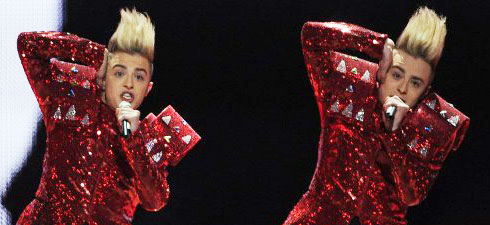Scholars increasingly see Waterloo as a pivotal event for Europe. The song, that is, not the battle. ABBA's breakout hit grabbed global attention when the Swedish quartet won the Eurovision Song Contest in 1974. The televised competition has also given the world Olivia Newton-John, Julio Iglesias, Céline Dion and the song "Volare."
Each May, about 40 countries from Iceland to Azerbaijan select bands to represent them in the battle, which first aired in 1956. More than 125 million people now watch it live and can vote by phone for their favorite act.
Tastemakers cringe. The contest is routinely savaged as being everything from a lowbrow hash of unoriginal pop to total camp. The winner in 1998 was an Israeli transsexual named Dana International with a song called "Diva." In 2006 the contest was won by Lordi, a Finnish heavy-metal band whose members dress as monsters, singing "Hard Rock Hallelujah." Ireland's 2008 entry was a sock-puppet turkey.
But 125 million Eurovision fans can't be wrong, argue a new band of academics. Instead of focusing on musical merits, they examine issues like "the concept of European community"; victories for "culturally peripheral nations"; and a "pan-European identity" fostered by the contest's ban on voting for one's own country. Read full article in the Wall Street Journal...
Europe-US
Europeans are as bad as Yanks
“Americans have always had a masochistic relationship with Europe,” writes British author Simon Doonan in Slate US.
You grovel to anybody with an English accent, regardless of how catastrophic the attendant teeth might be. When Frogs write disdainful books about how much chicer, thinner, and more cultivated they are than U.S. gals (French Women Don't Get Fat, etc.), you Americans rush out, buy zillions of copies, and flagellate yourselves with unappreciated Francophilia.
Americans, Doonan writes, “collude with the notion that Europe represents an antidote to crass U.S. materialism”. But there is antidote to this Eurofetishization – the 56th annual Eurovision Song Contest where –
Once a year, the good people of Europe take a break from binge-drinking, sex-trafficking, and serial-killing; snuggle up in front of the telly; and watch more than 40 countries duke it out for the best pop act of the year. [...]
Gird your grimacing muscles! If, this coming Saturday, you are able to sit through the entire three-hour-plus ordeal (you can watch on the Eurovision website), I can guarantee that, by the end of it, all notions of Euro superiority will collapse around your ankles like decomposing foundation garments.
Was this article useful? If so we are delighted!
It is freely available because we believe that the right to free and independent information is essential for democracy. But this right is not guaranteed forever, and independence comes at a cost. We need your support in order to continue publishing independent, multilingual news for all Europeans.
Discover our subscription offers and their exclusive benefits and become a member of our community now!












